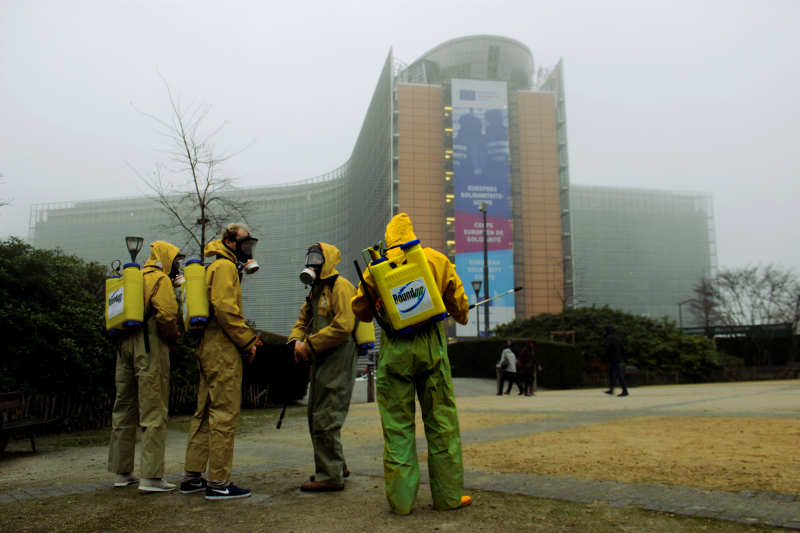
Chance to bolster EU's pesticide risk system against industry influence sees rise of big coalition
More than 100 civil society organisations and institutions including Corporate Europe Observatory, as well as 25 individual experts, have banded together as Citizens for Science in Pesticide Regulation, a new European coalition launched today, which demands a comprehensive reform of the EU pesticide risk assessment system.
Given the window of opportunity created by the current European Commission review of EU pesticide regulation, the EU Parliament’s ongoing investigation of the Union's authorisation procedure for pesticides, and the Commission’s recent proposal to increase transparency in European food law, the coalition calls on European regulators to overhaul the risk assessment system, as it has so far failed to protect people and the environment from harmful pesticides.
Corporate Europe Observatory’s agribusiness researcher and campaigner Nina Holland said:
“Much of our food and environment is contaminated with traces of harmful pesticides although EU rules have been promising drastic improvements for almost a decade. The current risk assessment is quite simply failing us.
“The reason for this is the heavy involvement of big pesticide corporations like Bayer-Monsanto, Syngenta and BASF in the EU risk assessment process, which currently allows them a big hand in the design of testing methods and the writing of safety reports for their own products. At the same time, scandals like the Monsanto Papers have shown that these pesticide manufacturers bully concerned politicians and smear critical independent scientists.
“As Citizens for Science in Pesticide Regulation we are calling on European regulators to bolster the current pesticide risk assessment and risk management system against industry influence and are proposing concrete steps to help create a non-toxic future.”
Science Policy Officer at Pesticide Action Network Europe, Dr Angeliki Lysimachou added:
“As a result of the pesticide industry driving the risk assessment procedure, many tons of harmful pesticides are used in Europe today, and the volumes are increasing even when scientific evidence from public research shows they are not safe. This must come to an end.”
Dr Apolline Rogers, lawyer at ClientEarth, pointed out:
“EU pesticides law already requires substances to have no harmful effects on humans and animal health– but evidence from the field proves that the rules are not respected. The authorities in charge need to remember their obligations under EU law. They must change the way they assess and authorise pesticides to make sure that people and environment are effectively protected.”
Notes to editors:
Read the full Citizens for Science in Pesticide Regulation manifesto and see the full list of coalition members here: https://www.pan-europe.info/sites/pan-europe.info/files/Citizens%20for%20Science%20in%20Pesticide%20Regulation_Manifesto_FINAL.pdf
The key reform proposals made by Citizens for Science in Pesticide Regulation aim to create a pesticide risk assessment and risk management system that:prioritises public health, the environment and sustainable agriculture - pesticides must be used only as a last resort when all other non-chemical alternatives have been applied and failed
ensures that decision-makers rely on data that is complete, public, up to date and free from industrial bias – safety testing must not be carried out by the pesticide industry itself and data requirements for pesticides should be updated according to the most recent scientific findings to address human developmental diseases and impact on ecosystems
enables decision makers, civil society and the scientific community to scrutinise the integrity and effectiveness of European pesticide policy - results and data of all pesticide safety tests shall be published on the internet in a consistent and searchable format
The coalition’s criticism of the current system for European pesticide regulation, in force since 2009, underlines the system’s failure to achieve its states purpose of ensuring high-level protection for human, animal and environmental health, as highlighted by:
the existence of major conflicts of interest in the regulatory system, as exemplified by the Monsanto Papers. Internal Monsanto documents recently disclosed in cancer litigation in the USA have shown how industry can actively subvert science, illustrating the dire need for regulators to keep industry at arm’s length from safety testing, risk assessment and risk management.
the pesticide industry’s involvement in processes supposed to assess the safety of its own products – both in the safety testing itself as well as in the designing of risk assessment methodologies. Expert panels of the European Food Safety Authority (EFSA) continue to include people with financial ties to the agrochemical industry.
scientific evidence indicating insufficient protection of humans and the environment from harmful pesticides in the European Union. See Bellanger et al (2015) on abnormally high rates of diseases in farming families and residents in agricultural areas, PAN Europe (2017) on the high levels of pesticide residues detected in food consumed in Europe, Schulz and Stehle (2015) and Stehle (2015) on the high levels of pesticide residues detected in the environment, and Hallmann et al (2017) as well as Woodcock et al (2016) on the decline of biodiversity and wildlife in proximity to agricultural areas.
